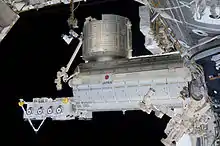National Space Development Agency of Japan
The National Space Development Agency of Japan (宇宙開発事業団, Uchū Kaihatsu Jigyōdan), or NASDA, was a Japanese national space agency established on October 1, 1969 under the National Space Development Agency Law only for peaceful purposes. Based on the Space Development Program enacted by the Minister of Education, Culture, Sports, Science and Technology (MEXT), NASDA was responsible for developing satellites and launch vehicles as well as launching and tracking them.
| 宇宙開発事業団 | |
| Agency overview | |
|---|---|
| Formed | October 1, 1969 |
| Dissolved | October 1, 2003 |
| Superseding agency | |
| Type | Space agency |

The first launch vehicles of NASDA (N-I, N-II, and H-I) were partially based on licensed technology from the United States, particularly the Delta rocket family. The H-II was the first liquid fuel rocket to be fully developed in Japan.
Hideo Shima, chief engineer of the original Shinkansen "bullet train" project, served as Chief of NASDA from 1969 to 1977.[1]
On October 1, 2003, NASDA merged with the Institute of Space and Astronautical Science (ISAS) and the National Aerospace Laboratory of Japan (NAL) into one Independent Administrative Institution: the Japan Aerospace Exploration Agency (JAXA).
SL-J was partially funded by Japan through NASDA; this cooperative Japanese-American mission launched a NASDA astronaut into Earth orbit using the Space Shuttle in 1992.[2]
Work on the Japanese Experiment Module at ISS, and also HOPE-X, was started under NASDA and inherited by JAXA.
See also
References
- Shima, Hideo (1994). "Birth of The Shinkansen - A Memoir" (PDF). Japan Railway & Transport Review. EJRCF. 11: 45–48. Retrieved 2020-01-07.
- NASA - Life into Space (1995/2000) - Volume 2, Chapter 4, Page: Spacelab-J (SL-J) Payload Archived 2010-05-27 at the Wayback Machine (Book @ Life into Space Archived 2011-01-04 at the Wayback Machine)
External links
- NASDA history before merger into JAXA
- (in Japanese) The National Space Development Agency Law (Abolished)
- NASDA History
- NASDA Press Release Archives (2000-2003)
- The Ministry of Education, Culture, Sports, Science and Technology (MEXT)
- Aerospace Industry of Japan. The Society of Japanese Aerospace Companies